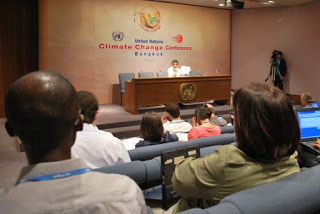
In an impassioned and well-evidenced press conference, the Plurinational State of Bolivia called for more ambitious pledges from developed countries to reduce emissions at home. He noted that even the sum of the highest-end pledges fall far short of what is required in order to restrict the global increase in temperature to just 2 degrees Celsius. Instead, the highest-end pledges will lead us on a path towards an increase in at least 4 degrees Celsius – “a scenario of catastrophe”.
Developing countries have already pledged more emissions reductions than developed countries. Developed countries have said that they will only increase pledges when firm rules are set for market-based mechanisms (for example, REDD) and Land Use, Land-Use Change, and Forestry (LULUCF). Further, much of developed countries’ pledges are double-counted in global tallies because they are comprised in part of offsets in developing countries. The bulk of reductions efforts will thus fall upon the shoulders of developing countries while developed countries continue to refuse to reduce emissions at home, resulting in net reductions lower than promised. Reflecting upon this, the Bolivian delegate warned that “You can’t cheat nature”.
He lamented the deliberations over the agenda here in Bangkok, saying that “it’s insane” to be placing so much time and resources on it when it is clear that “we didn’t finish the job” in Cancun and that major aspects of the Bali Action Plan remain to be addressed. Although he has been pleasantly surprised about the level of support from other delegates in the corridors, few other Parties have officially endorsed Bolivia’s views in the negotiations. Calling for more precise rules, greater emissions reductions in the emitting countries themselves, and a strengthened and binding amendment to the Kyoto Protocol, he emphasized that we need to increase our collective ambitions “in order to be consistent with the integrity of our Earth’s system”.
Daily coverage of the negotiations is provided by IISD-Reporting Services. Video interviews from Bangkok can be accessed at Climate Change TV.
